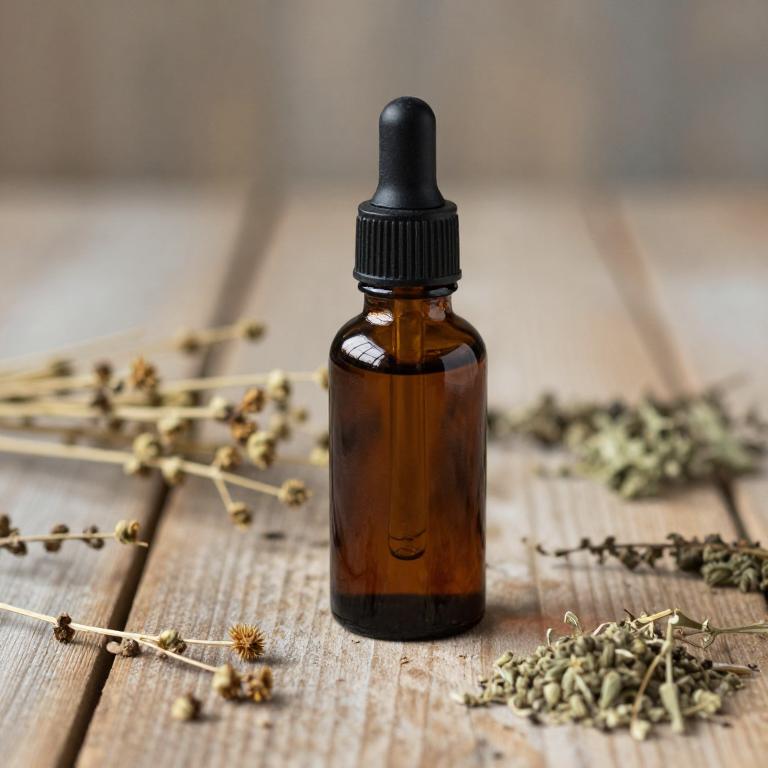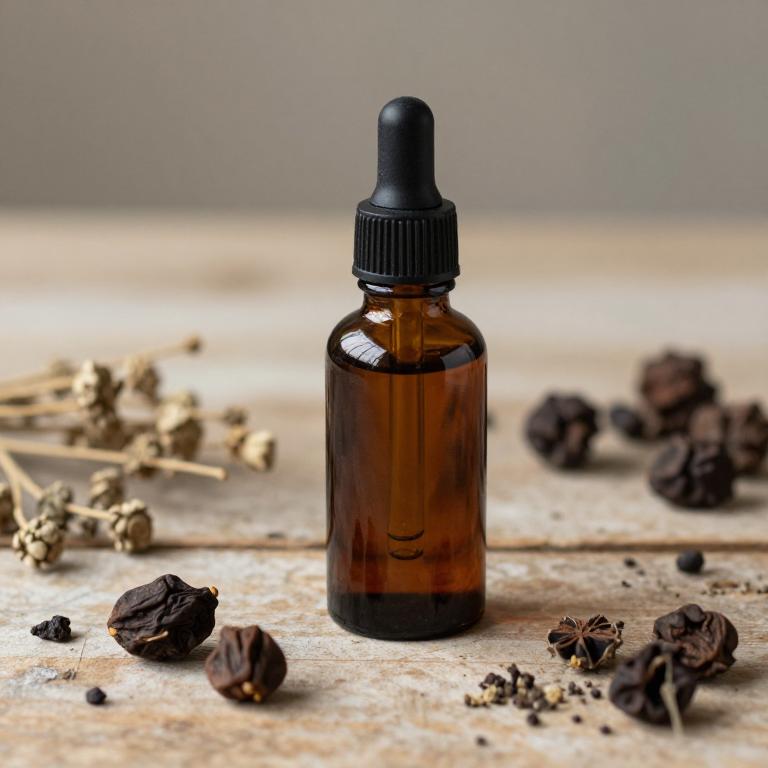10 Best Herbal Tinctures For Abdominal Pain

Herbal tinctures are concentrated liquid extracts made from various medicinal plants and are often used to alleviate abdominal pain by addressing underlying causes such as inflammation, spasms, or digestive issues.
Common herbs used in these tinctures include peppermint, ginger, chamomile, and turmeric, each known for their soothing and anti-inflammatory properties. When taken orally, these tinctures can help relax gastrointestinal muscles, reduce nausea, and ease cramping associated with conditions like irritable bowel syndrome or indigestion. However, it is important to consult a healthcare provider before using herbal tinctures, as they may interact with medications or have side effects.
Proper dilution and dosage are also crucial to ensure safe and effective use.
Table of Contents
- 1. Turmeric (Curcuma longa)
- 2. Fennel (Foeniculum vulgare)
- 3. Cumin (Cuminum cyminum)
- 4. Ginger (Zingiber officinale)
- 5. Thistle (Silybum marianum)
- 6. Chamomile (Matricaria chamomilla)
- 7. Black pepper (Piper nigrum)
- 8. Stinging nettle (Urtica dioica)
- 9. Dog rose (Rosa canina)
- 10. Caraway (Carum carvi)
1. Turmeric (Curcuma longa)

Curcuma longa, commonly known as turmeric, has been traditionally used for its anti-inflammatory and analgesic properties, making it a popular ingredient in herbal tinctures for managing abdominal pain.
These tinctures typically extract the active compound curcumin from the rhizomes of the plant, which is known to reduce inflammation and oxidative stress in the gastrointestinal tract. Studies suggest that curcumin may help alleviate symptoms of conditions such as irritable bowel syndrome and inflammatory bowel disease by modulating gut microbiota and reducing intestinal inflammation. However, while some individuals report relief from abdominal discomfort using turmeric tinctures, they should not replace conventional medical treatments without consulting a healthcare professional.
It is important to note that the bioavailability of curcumin is low, so formulations with black pepper extract or other absorption enhancers are often recommended for better efficacy.
2. Fennel (Foeniculum vulgare)

Foeniculum vulgare, commonly known as fennel, is a popular herb used in the preparation of tinctures for digestive support, including relief from abdominal pain.
The essential oils in fennel, particularly anethol, have mild antispasmodic and carminative properties that help soothe cramping and reduce gas, making it beneficial for conditions like colic or irritable bowel syndrome. When prepared as a tincture, fennel can be easily absorbed into the bloodstream, allowing for quicker onset of its soothing effects on the gastrointestinal tract. It is often used in traditional herbal medicine to alleviate bloating, nausea, and discomfort associated with digestive disorders.
However, it is important to consult a healthcare professional before using fennel tinctures, especially during pregnancy or for individuals with known allergies or chronic health conditions.
3. Cumin (Cuminum cyminum)

Cuminum cyminum, commonly known as cumin, has been traditionally used in herbal medicine for its potential digestive benefits.
Cumin seed tinctures are often prepared by soaking the seeds in alcohol to extract their active compounds, which may help alleviate symptoms of abdominal pain. The essential oils in cumin, such as cuminaldehyde and limonene, are believed to have carminative and antispasmodic properties that can ease gastrointestinal discomfort. Some studies suggest that cumin may reduce bloating, gas, and cramping, making it a natural remedy for mild digestive issues.
However, it is important to consult a healthcare professional before using cumin tinctures, especially for chronic or severe abdominal pain.
4. Ginger (Zingiber officinale)

Zingiber officinale, commonly known as ginger, has been widely used for its medicinal properties, including its effectiveness in alleviating abdominal pain.
Herbal tinctures made from fresh or dried ginger root are often prepared using alcohol as a solvent to extract the active compounds, such as gingerol and shogaol, which have anti-inflammatory and analgesic effects. These tinctures can help reduce symptoms of cramping, bloating, and nausea associated with gastrointestinal discomfort. When taken in appropriate doses, ginger tinctures may provide a natural and effective alternative to conventional medications for mild to moderate abdominal pain.
However, it is important to consult with a healthcare professional before using ginger tinctures, especially for individuals with existing medical conditions or those taking other medications.
5. Thistle (Silybum marianum)

Silybum marianum, also known as milk thistle, is a herbal remedy that has been traditionally used for its potential liver-protecting properties.
While it is commonly used for liver health, some studies suggest that silybum marianum tinctures may also help alleviate symptoms of abdominal pain, particularly when the discomfort is related to digestive or liver issues. The active compound, silymarin, is believed to have anti-inflammatory and antioxidant effects that may reduce inflammation in the gastrointestinal tract. However, it is important to consult with a healthcare provider before using silybum marianum tinctures, as they may interact with certain medications or conditions.
Overall, while not a cure for abdominal pain, silybum marianum tinctures may be considered as a complementary therapy under professional guidance.
6. Chamomile (Matricaria chamomilla)

Matricaria chamomilla, commonly known as German chamomile, is a popular herb used in the preparation of tinctures for its calming and anti-inflammatory properties.
These tinctures are often utilized to alleviate symptoms of abdominal pain, particularly those associated with digestive disorders such as colic, gas, and spasms. The active compounds in chamomile, including flavonoids and bisabolol, contribute to its ability to reduce intestinal inflammation and relax smooth muscle tissue. When taken orally, chamomile tinctures can soothe the gastrointestinal tract and ease discomfort.
However, it is important to consult a healthcare professional before use, especially for individuals with allergies or those taking other medications.
7. Black pepper (Piper nigrum)

Piper nigrum, commonly known as black pepper, has been traditionally used in herbal medicine for its potential anti-inflammatory and analgesic properties.
When prepared as a tincture, Piper nigrum may help alleviate abdominal pain by stimulating digestion and reducing gut inflammation. The active compound, piperine, is believed to enhance the absorption of other medicinal compounds and may have a mild effect on pain relief. However, it is important to consult a healthcare professional before using black pepper tinctures, as they can interact with certain medications.
While some individuals may find relief from abdominal discomfort using this herbal remedy, its efficacy can vary and should not replace professional medical treatment.
8. Stinging nettle (Urtica dioica)

Urtica dioica, commonly known as stinging nettle, has been traditionally used in herbal medicine for its potential anti-inflammatory and analgesic properties.
When prepared as a tincture, Urtica dioica may help alleviate symptoms of abdominal pain by reducing inflammation and supporting digestive health. The tincture is typically made by soaking the dried leaves and stems in alcohol, allowing the active compounds to be extracted over time. This herbal remedy is often used for conditions such as irritable bowel syndrome or inflammatory bowel disease.
However, it is important to consult a healthcare professional before use, as it may interact with certain medications or be unsuitable for individuals with specific health conditions.
9. Dog rose (Rosa canina)

Rosa canina, commonly known as dog rose, has been traditionally used in herbal medicine for its potential benefits in addressing various health issues, including abdominal pain.
The tinctures derived from the flowers and hips of Rosa canina are believed to possess anti-inflammatory, antispasmodic, and digestive properties that may help alleviate discomfort associated with gastrointestinal disorders. These tinctures are often prepared using alcohol as a solvent to extract the active compounds, making them more bioavailable and potent. Due to their mild nature, Rosa canina tinctures are generally considered safe for long-term use, although it is advisable to consult with a healthcare professional before starting any new herbal regimen.
As a natural remedy, Rosa canina tinctures offer a gentle and alternative approach to managing abdominal pain, complementing conventional treatments when appropriate.
10. Caraway (Carum carvi)

Carum carvi, commonly known as caraway, has been traditionally used in herbal medicine to alleviate abdominal pain, particularly related to digestive issues such as bloating, cramping, and indigestion.
Caraway seed tinctures are prepared by soaking the dried seeds in alcohol to extract their essential oils, which contain compounds like limonene and apiol that have carminative and antispasmodic properties. These properties help relax the smooth muscles of the gastrointestinal tract, reducing discomfort and promoting digestion. When used as a tincture, carum carvi is typically diluted in water or taken with meals to minimize potential irritation.
While generally considered safe, it is advisable to consult a healthcare professional before use, especially for individuals with known allergies or chronic health conditions.